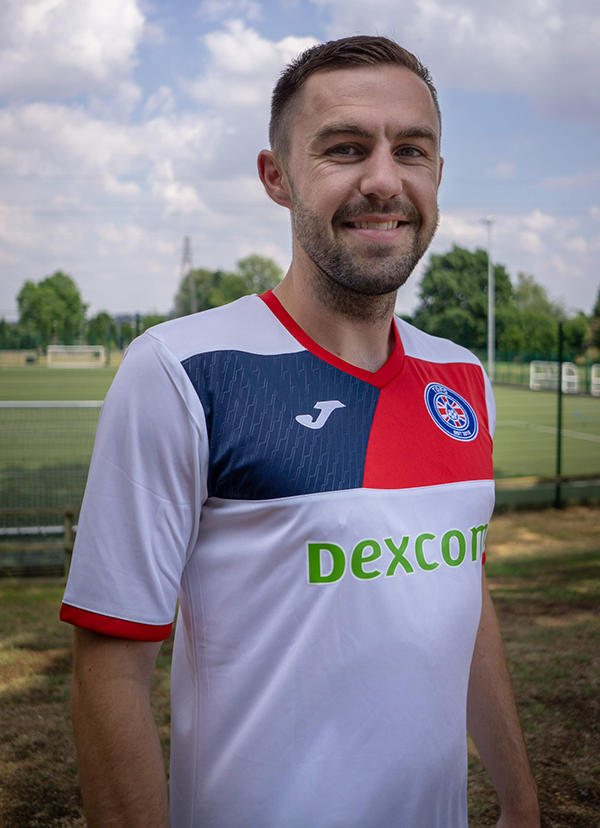The founder of a national network supporting amateur and professional footballers with diabetes, has spoken about completing his research-based Master’s degree at the University of Worcester.

Chris Bright, 30, from Redditch, completed an MRes in the Socio-Cultural Studies of Sport and Exercise. For him, the choice to focus his research on the stigma surrounding diabetes in sports people was a profoundly personal one.
In 1999, Chris was diagnosed with Type 1 Diabetes, but he was determined not to let this prevent him pursuing his dream of growing up to play football for his country. In 2016, despite the challenges posed by his condition Chris received the call he had dreamt of his whole life: a call-up to the Wales national futsal squad.
But for Chris, the journey from diagnosis to international colours had been a long and difficult one.
“There aren’t many medical conditions whereby the condition you live with classifies you as disabled, but where you still have to compete with the able-bodied mainstream,” he says. “There’s no ‘diabetic football’ in the Paralympics.”
“I had very little support and advice about how to manage my diabetes around my football growing up, but I felt passionate about changing that.”
The Diabetes Football Community
In 2017, Chris founded The Diabetes Football Community, a support network for anyone trying to balance a passion for sport with the need to manage diabetes. Today TDFC is a globally respected voice in the field of inclusive sport.
“It was immediately clear that we were on to something with TDFC,” Chris says. “There was obviously a pent-up need there amongst sports people with diabetes for more support and a sense of community. I guess TDFC provided something that previously had been missing.”
The success of TDFC led Chris to ask the simple question ‘why?’, and it was this simple question that led him back into academia in 2017 - five years after his first graduation.
“I had been working in retail and enjoying my futsal,” he explains, “but when I realised that TDFC was making such a big difference to other people with diabetes, I wanted to find out why. We were clearly helping to bridge a gap, but I wanted to understand more about why that gap was there.”
Studying at Worcester
Chris enrolled on an MRes at the University of Worcester because he knew that the flexibility of a research Masters’ would enable him to set his own terms and ask the questions that mattered most to him.
“I wanted to provide academic foundations for why this incredible community continues to grow, support and enhance the lives of sports people with diabetes,” he explains. “Academic research remains at the forefront of change globally, and I felt this was the right way to try to influence leaders across the world.”
And after three years of tireless research off the pitch, and continued sporting success on it, the results are in.
“One of the main things the research revealed is the extent to which people with diabetes in football feel stigmatised,” Chris explains. “Because of the persistence of a macho culture in football in particular, people feel they need to keep their diabetes a secret in case it is perceived as a weakness. This in turn causes them problems in identifying with the condition, which then leads to poorer self-management and potentially negative health outcomes on and off the pitch.”
Research
Chris’ research found that TDFC helped to combat the stigma surrounding diabetes in football by providing strong peer support and positive reinforcement, as well as improving understanding and helping to dispel the stigma surrounding diabetes.
“I think the findings are highly significant,” Chris says, “because I’ve been able to demonstrate that the prevailing culture within the sport many of us have grown up with actually has the power to adversely affect our health.”
“With TDFC we’ve helped people to identify more positively with their condition who previously may not have done, people who may have kept it a secret because of their fear of stigma, but who now can see – possibly for the first time – a way to be passionate about their sport and proud about their diabetes both at the same time. If that helps improve the mental and physical health of footballers or any sports people living with diabetes in the long run, then that’s a really positive outcome.”
The future
Chris is currently working as a Health & Wellbeing Coach for the NHS’ Type 2 Diabetes Prevention Programme along-side his work with TDFC, and a return to academia is also on the cards.
“If I can help people who are at risk of developing type 2 to think about prevention, then they might avoid a life which might otherwise look a bit like mine,” he says.
He also hasn’t ruled out a return to academia.
“There’s a lot more work that we can do to try and improve the outcomes for people with diabetes who want to pursue their passion for sport. TDFC is obviously a really big part of this, but there’s a vital role for research in helping to deepen our understanding and shape the future direction of work in this area.”
“The University of Worcester is the perfect place for this kind of research because it is a global leader in the field of inclusive sport,” he adds. “So, who knows, maybe I’ll be back sooner rather than later.”